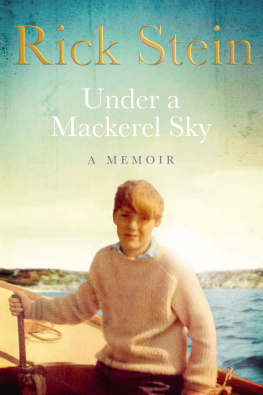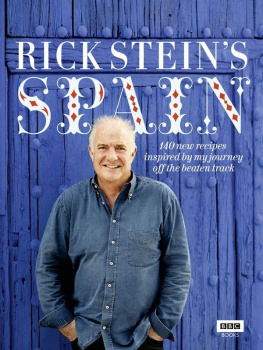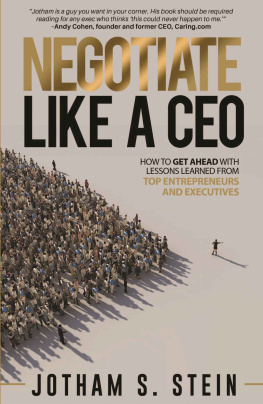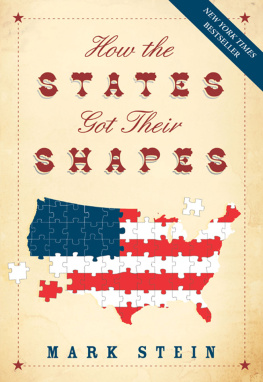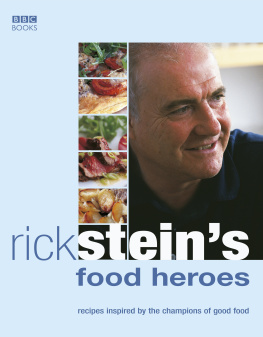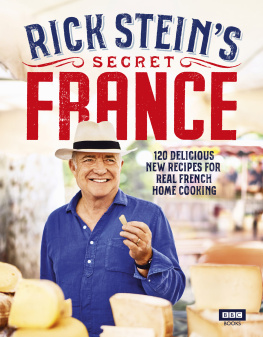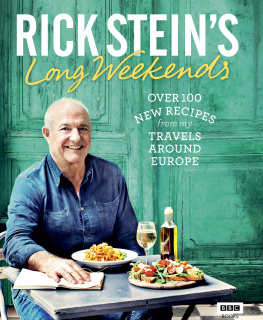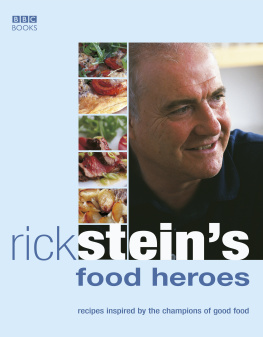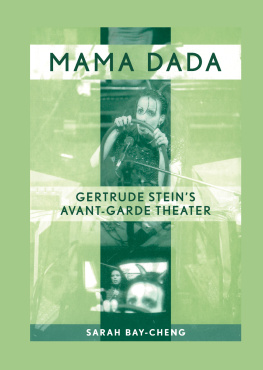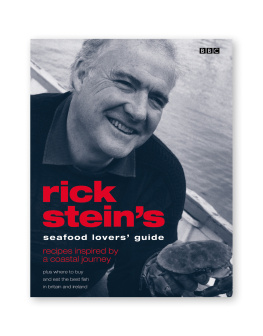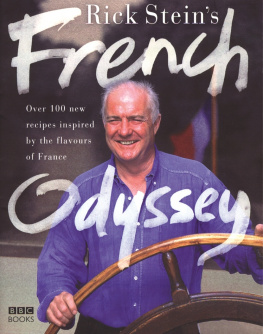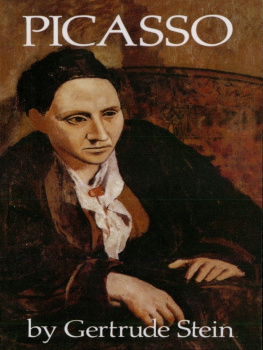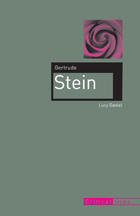CONTENTS
About the Book
All men should strive to learn before they die, what they are running from, and to, and why.
Rick Steins childhood in 1950s rural Oxfordshire and North Cornwall was idyllic. His parents were charming and gregarious; their five children much-loved and given freedom typical of the time. As he grew older the holidays were filled with loud and lively parties in his parents Cornish barn. But ever-present was the unpredictable mood of his bipolar father, with Rick frequently the focus of his anger and sadness.
When Rick was 18 his father killed himself. Emotionally adrift, Rick left for Australia, carrying a suitcase stamped with his fathers initials. Manual labour in the outback followed by adventures in America and Mexico toughened up the nave public schoolboy, but at heart he was still lost and unsure what to do with his life.
Eventually, Cornwall called him home. From the entrepreneurial days of his mobile disco, the Purple Tiger; to his first, unlikely nightclub where much of the time was spent breaking up drink-fuelled fights, Rick charts his personal journey in a way that is wry and perceptive; engaging and witty.
About the Author
RICK STEINS passion for using good-quality local produce and his talent for creating delicious flavour combinations in his books and restaurants have won him a host of awards, accolades and fans. As well as presenting a number of television series, he has published many bestselling cookery books, including Coast to Coast, Rick Steins Far Eastern Odyssey, Rick Steins Spain and Rick Steins India.
Rick is a firm supporter of sustainable fishing and farming techniques, which he strives to maintain in Padstow, Cornwall, where he runs an acclaimed restaurant and a seafood cookery school, as well as a delicatessen, patisserie and hotel. In 2003 Rick was awarded an OBE for services to West Country tourism. He divides his time between Padstow and Australia, where he opened a restaurant, Rick Stein at Bannisters, in 2009.
This ebook is copyright material and must not be copied, reproduced, transferred, distributed, leased, licensed or publicly performed or used in any way except as specifically permitted in writing by the publishers, as allowed under the terms and conditions under which it was purchased or as strictly permitted by applicable copyright law. Any unauthorized distribution or use of this text may be a direct infringement of the authors and publishers rights and those responsible may be liable in law accordingly.
Version 1.0
Epub ISBN 9781448147243
www.randomhouse.co.uk
1 3 5 7 9 10 8 6 4 2
First published in 2013 by Ebury Press, an imprint of Ebury Publishing A Random House Group company
Copyright Rick Stein 2013
Rick Stein has asserted his right to be identified as the author of this Work in accordance with the Copyright, Designs and Patents Act 1988
All photographs Rick Stein unless otherwise stated
All rights reserved. No part of this publication may be reproduced, stored in a retrieval system, or transmitted in any form or by any means, electronic, mechanical, photocopying, recording or otherwise, without the prior permission of the copyright owner
The Random House Group Limited Reg. No. 954009
Addresses for companies within the Random House Group can be found at
www.randomhouse.co.uk
A CIP catalogue record for this book is available from the British Library
ISBN 9780091949907 (hardback)
ISBN 9780091957018 (trade paperback)
To buy books by your favourite authors and register for offers visit www.randomhouse.co.uk
For Sas, Ed, Jack, Charles, Zach,
Olivia, Jeremy, John and Henrietta
And in memory of Janey
All men should strive to learn before they die,
what they are running from, and to, and why
James Thurber
PART ONE
Rikki-Tikki-Tavi
I
I loved fishing off the rocks with my dad. There werent a lot of things I loved doing with him; I was a bit scared of him because he shouted a lot. But fishing was a time when the tying of knots in nylon line and the threading of ragworms on hooks involved us with practicalities and I forgot my reserve. He kept his wooden reels in a green canvas bag flecked with fish scales and he always took with him a little wire folding stool with an orange cloth seat which he also used when painting watercolours of the medieval bridge at Wadebridge or the view of the Camel estuary towards Stepper and Pentire Point. We had a house in Cornwall on Trevose Head and my dad knew a lot of local fishermen, mostly from going to pubs: the Cornish Arms and Farmers Arms in St Merryn and several of the half a dozen or so pubs in Padstow, particularly the London Inn, the Golden Lion and the Caledonian.
A strong memory of childhood is sitting in the back of our Jaguar with my sister Henrietta drinking St Austell ginger beer and eating crisps with a little blue paper twist of salt, waiting while my mum and dad had a drink on a dull day. We were never allowed inside the pub but the smell of beer and tobacco smoke and the sound of good-humoured conversation billowing out as people came and went was tantalising, particularly in the warm summer drizzle, when the dampness of the air seemed to hold in those aromas, infused with the scent of wild fennel from hedges nearby.
Henrietta remembers interminable hours in one boat or another with Bill Cullum fishing for mackerel, garfish and pollack, or with Johnnie Murt hauling lobster pots. Most of the time she would sit and read. Occasionally, wed both be sick. Once, alone with my father in a small boat, we narrowly missed being turned over in the surf at Polzeath. In our excitement at catching so many bass we had let our lines become tangled, snagging the propeller and stopping the engine. I remember the panic then, as we drifted towards the breaking waves. Years later two local boys, Bronco Bate and Arnold Murt, out salmon netting on the Doom Bar drowned because the same thing happened; the atmosphere in Padstow the next morning was as dark as I can recall.
The downstairs bedroom next to the kitchen in our house, Polventon, would often be used for storing live lobsters, crab or crayfish which crawled over the floor, bubbling and making cracking noises. I loved the crab meat and quite liked the crayfish, but the lobster was too intense. Its firm, white, sweet-salty flesh was too strong for a child and the bright yellow mayonnaise too pungent with the olive oil that my mother always used. How special now are those flavours that I couldnt take then; the beer tasted horribly bitter, particularly the Whitbread Pale Ale which some of the workers on our farm drank. I can still recall the black, heavy screw stoppers with red rubber seals, and the men sitting with their glasses on the just-filled barley sacks at lunch break during harvest time.
Fishing off the rocks we never caught much more than wrasse and pollack. The wrasse were gorgeously coloured; deep red, orange, yellow and sometimes green or golden-hued, but tasted of nothing. The pollack were always the same colour, a silver belly and brown back and large dark blue eyes. My dad and I would take the fish back to the house where the wrasse were treated with little enthusiasm by my mother. She left them till they were starting to smell, I think to make me feel better about it, then threw them out into the springy cliff grass for the gulls. The pollack she made into fish cakes, often with mackerel, which were ever-present due to the almost daily boat-fishing trips. All the cooking Ive ever done since is in some way an attempt to recapture some of the flavours of the cooking at home when I was a boy. Those pollack fish cakes with mashed potatoes, parsley, salt, pepper and dazzlingly fresh mackerel, just put under the grill with a sprig of fennel, are still the best Ive ever eaten.

